|
|
|
Sort Order |
|
|
|
Items / Page
|
|
|
|
|
|
|
| Srl | Item |
| 1 |
ID:
117056
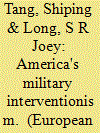

|
|
|
|
|
| Publication |
2012.
|
| Summary/Abstract |
By synthesizing material forces with ideational forces more organically via a social evolutionary approach, we advance a deeper understanding about post-World War II American military interventionism. We argue that post-World War II American military interventionism - that is, the American elites' and public's support for America's military intervention abroad - cannot be understood with ideational or psychological forces alone. Rather, two crucial material variables, namely, geography and aggregate power amplified by superior technological prowess, are indispensable for understanding the propensity for the United States to intervene militarily abroad. These two factors have powerfully shielded the American elites and public from the horrendous devastation of war. As a result, compared to their counterparts in other major states, American citizens and elites have tended to be less repelled by the prospect of war. The outcome is that since World War II the United States has been far more active in military intervention overseas than other major states.
|
|
|
|
|
|
|
|
|
|
|
|
|
|
|
|
| 2 |
ID:
084672


|
|
|
|
|
| Publication |
2008.
|
| Summary/Abstract |
Recent events have led to a renewed scholarly interest in empire and the question whether the United States and its policies abroad constitute an "American Empire." This essay clarifies the various uses of the term and argues that conceptual overstretching retards scholarly analysis of the phenomenon. This essay suggests a definition of the term "empire" and provides an ideal-typical reference point to study its empirical variations. I provide a typology of empires to guide the analysis of common features as well as distinguishing characteristics. We can then answer the question whether contemporary manifestations might differ from their historical precursors. American unilateralist policy today differs in fundamental respects from previous imperial processes and structures. In contradistinction with earlier empires, U.S. policies lack the incentive structures for peripheral elites and local populations that typified imperial rule in the past. While falling short of constituting a formal empire, its policies face the same contradictions that confronted the western maritime empires as well as the USSR and which led to their dismemberment.
|
|
|
|
|
|
|
|
|
|
|
|
|
|
|
|
| 3 |
ID:
105840
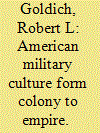

|
|
|
| 4 |
ID:
101283
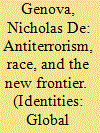

|
|
|
|
|
| Publication |
2010.
|
| Summary/Abstract |
Following Barack Obama's election as United States president, the illusion that the worst excesses of the Bush administration are now simply finished must be tempered by a sober assessment of the deeply consequential institutionalization of antiterrorism as the intransigent idiom of a new species of security state formation. Obama's assumption of responsibility for the conduct of the so-called War on Terror has committed him to the dominant ethos of antiterrorism and a multifaceted program of securitization, "domestically" and internationally. Furthermore, the task of reinvigorating United States nationalism by exalting American exceptionalism is one that deeply conjoins Obama with his predecessor. This is, perhaps, nowhere so evident as in Obama's dissimulations of the racial singularity and salience of his accession to the presidency. Indeed, he compulsively deracialized his election in favor of an American exceptionalist gesture of patriotic postracialism. This essay interrogates the relation between this "postracial" Americanism and a distinctly imperial multiculturalism. Through this "postracial" and assimilationist vision of empire, and by means of the crucial (racially ambiguous) figure of the Muslim, the United States has fashioned itself as the decisive police power of an incipient Global Security State, charged with putting in order the wild new frontiers of an unruly planet.
|
|
|
|
|
|
|
|
|
|
|
|
|
|
|
|
| 5 |
ID:
100496
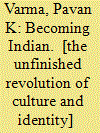

|
|
|
|
|
| Publication |
New Delhi, Allen Lane, 2010.
|
| Description |
xi, 275p.
|
| Standard Number |
9780670083466,hbk
|
|
|
|
|
|
|
|
|
|
|
|
Copies: C:1/I:0,R:0,Q:0
Circulation
| Accession# | Call# | Current Location | Status | Policy | Location |
| 055501 | 954.052/VAR 055501 | Main | On Shelf | General | |
|
|
|
|
| 6 |
ID:
178334
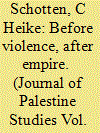

|
|
|
|
|
| Summary/Abstract |
Ariella Aïsha Azoulay’s new book, Potential History: Unlearning Imperialism, offers a rethinking of violence and modernity that presents collaborative, reparative forms of world building as the only viable means of resisting and overcoming the ravages of imperialism. The book is at once a reckoning with empire, a semiautobiographical theorization of complicity, and a magnificent analytic exposé of imperial technologies of knowing, including photography, art, archives and museums, history, sovereignty, and human rights.
|
|
|
|
|
|
|
|
|
|
|
|
|
|
|
|
| 7 |
ID:
074908
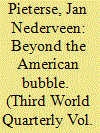

|
|
|
|
|
| Publication |
2006.
|
| Summary/Abstract |
In the 21st century, does empire make sense? From the viewpoint of flexible and increasingly de-territorialised capitalism, does empire matter or is it a costly liability? Are the new wars an expression of US capitalism or do they reflect a US superpower syndrome and path dependence on the national security state? This paper takes the latter view and argues that the superpower syndrome is embedded in the American bubble. Civilian casualty rates in Iraq and Afghanistan are extraordinarily high. This occurs at the confluence of several trends: the USA seeking land power on a distant continent, the tendency to view countries as strategic real estate and the American bubble that leads Americans to underestimate resistance. In closing I draw a balance sheet of whether and how empire matters and briefly address the global realignments that are underway.
|
|
|
|
|
|
|
|
|
|
|
|
|
|
|
|
| 8 |
ID:
105932
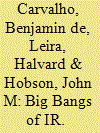

|
|
|
|
|
| Publication |
2011.
|
| Summary/Abstract |
International relations as we know them emerged through the peace of Westphalia, and the discipline of International Relations emerged in 1919 and developed through a First Great Debate between idealists and realists. These are the established myths of 1648 and 1919. In this article we demonstrate how historical and historiographical scholarship has demolished these myths, but that the myths regardless are pervasive in the current textbooks that are used in teaching future IR scholars. Disciplinary dialogue seems to have failed completely. Based on a detailed reading of the myths and their perpetuation, we discuss the consequences of the discipline's reliance on mythical origins, why there has been so little incorporation of revisionist insight and what possibilities there are for enhancing the dialogue.
|
|
|
|
|
|
|
|
|
|
|
|
|
|
|
|
| 9 |
ID:
155315
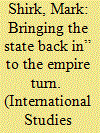

|
|
|
|
|
| Summary/Abstract |
Through most of the seventeenth century, European states used an “imaginary” boundary in the Atlantic referred to as “the line” to cordon off the affairs of Europe from those in the New World. The line structured colonial rule, captured in the phrase “there is no peace beyond the line.” However, by the middle of the eighteenth century, the idea of “the line” no longer held. Common explanations ranging from the rise of capitalism, technology, and interstate competition do not explain this shift. Instead, I argue that the “golden age of piracy” was instrumental. In giving this explanation, I argue that the empire turn in IR has under-theorized the tensions between state and empire in the modern era. I introduce the state–empire hybrid polity as one that is constantly mediating the tensions between the difference characteristic of empire and the integration of the state. “The line” was how European states mediated this tension in the seventeenth century. Pirates took advantage of the open markets and ungoverned spaces inherent in the line, causing a crisis in colonial rule. To defeat piracy and make the world safe for trade, these tensions needed to be remediated and “the line” transformed. As an unintended consequence, this put further strain on England’s North American empire.
|
|
|
|
|
|
|
|
|
|
|
|
|
|
|
|
| 10 |
ID:
124733
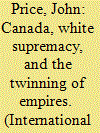

|
|
|
|
|
| Publication |
2013.
|
| Summary/Abstract |
Taking a transnational approach, this essay explores the dynamic circuits of global racisms, resistance, and imperial politics that obliged Canadian policymakers to secure racist exclusions while simultaneously obscuring them. The case studies examined in this essay-British Columbia's denial of the franchise to First Nations and Chinese, adoption of the Natal Act, and the comprehensive federal exclusions adopted after the 1907 white race riots in Vancouver-illustrate how racist immigration policies, both provincial and federal, had to take into account resistance and international factors as perceived by the British Colonial Office. Taken in conjunction with Indigenous history, the history of transpacific migration to Canada offers important insights into the role of white supremacy in a colonial settler state such as Canada.
|
|
|
|
|
|
|
|
|
|
|
|
|
|
|
|
| 11 |
ID:
087510
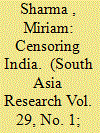

|
|
|
|
|
| Publication |
2009.
|
| Summary/Abstract |
During the early twentieth century, the emerging medium of cinema in British India became a distinctly contested political issue, revealing the tensions and limitations of empire. The record on cinematographic censorship indicates a number of competing interests and changing views, while political transformations and messy realities on the ground defied the efficacy of censorship. Even as many Indian filmmakers sought to convey messages of nationalist aspirations, the perceived need to guard against the revolutionary thoughts of communism and ideas from America that seemed to promote democracy and promiscuity fuelled censorship as a major multivocal imperial policy. Beset by many obstacles, it sought to control the exhibition of both Indian and foreign cinematic productions.
The article seeks to understand the genealogy of censorship derived from prior British attempts to regulate literary and dramatic productions. In the 1920s, anxieties about the maintenance of law and order and protection of British rule during a period of increasing Indian nationalist unrest had to be integrated with various concerns about deteriorating economic conditions. As Indian cinema struggled to come into its own, the issue of control became a central concern for both coloniser and colonised, while both faced threats from the influx of foreign (especially Hollywood) films.
The article also explores why it was deemed so important to bring cinema under the colonial gaze. While there was no unified front on how to deal with this new medium, it was perceived as highly in-fluential, with great potential for harmful or beneficial propaganda impacts. Finally, considerations of the competing demands of moral concerns were juxtaposed to the growing economic needs of the Indian film industry.
Throughout, it transpires from archival research how defining policy issues became ever more critical and how the complexities of implementation were made more difficult by the 'global' nature of policy formation as opposed to the more 'local' nature of the performance of control.
|
|
|
|
|
|
|
|
|
|
|
|
|
|
|
|
| 12 |
ID:
182950
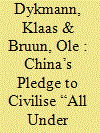

|
|
|
|
|
| Summary/Abstract |
With China’s global rise, both its state leadership and key academics have engaged in developing a civilisational discourse for the twenty-first century partly based on ancient cosmological concepts. This article explores the meanings of and intentions behind this discourse, including its promise of a Chinese-led world order, and discusses its intended audience and international appeal. In the backdrop of theoretical debates on empires and their missions, the article claims that without a corresponding cultural appeal, China’s rising economic power and geostrategic clout are insufficient conditions to realise an empire in the classical sense. Growing inconsistencies mar the country’s imperial ambitions, such as those between a global civilising outreach and a toughening domestic embrace. Instead, imperial rhetoric is cautiously integrated in the party-state’s restoration of a Chinese “empire within,” indicating self-centredness and a lurking re-traditionalising of Chinese state power.
|
|
|
|
|
|
|
|
|
|
|
|
|
|
|
|
| 13 |
ID:
103271
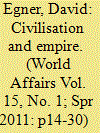

|
|
|
| 14 |
ID:
151221
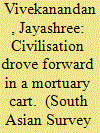

|
|
|
|
|
| Summary/Abstract |
Violence presents us with an interesting motif to study colonial politics, aptly captured in James Milne’s telling metaphor. Its inextricable association with colonialism implied a gradual conflation of political order with civilisation that is discernible in extant writings. The conventional paradigm in International Relations (IR) regards order as coterminous with the domestic domain and anarchy to be the structural attribute of international politics. This dichotomous divide permits little space for the hybrid states of existence of both anarchy and order that were often witnessed in the colonies and written about. The article examines the manner in which colonialism applied the notion of violence to the Indian context that was in denial of such complexities. It further argues that bringing imperial relations within the ambit of IR would help explain the differentiated interpretations of sovereignty that marked the parallel existence of the sovereign state system and the imperial political system.
|
|
|
|
|
|
|
|
|
|
|
|
|
|
|
|
| 15 |
ID:
176496
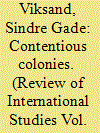

|
|
|
|
|
| Summary/Abstract |
While structural models of empire have recently re-emerged in the theoretical debates in the field of International Relations, a lack of attention has been paid to peripheral actors therein. This is particularly true for the analysis of the peripheries’ relations with polities outside the imperial structure of which the peripheries are a part. In this article, I build a framework to better understand how these extra-imperial ties are translated into peripheral positional power. This framework is constructed on the basis of three core arguments. First, to theorise peripheral power, peripheries need to be positioned in networks outside the imperial structure. Second, the positional power of peripheries depends on the quality of the ties they have to external actors. Peripheries with dense and exclusive ties to external actors are more powerful than those with only sparse and non-exclusive ties. Third, from the different combinations of density and exclusivity arise not only variations in positional power, but also the likely strategies that are engaged in forming alliances with external actors. These logics are illustrated through the study of two cases of the diplomacy of decolonisation: the American Revolutionary War and the Angolan War of Independence.
|
|
|
|
|
|
|
|
|
|
|
|
|
|
|
|
| 16 |
ID:
193124
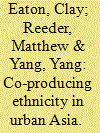

|
|
|
|
|
| Summary/Abstract |
The articles in this special issue examine engagements across ethnic boundaries in Asian cities over the past two centuries. We see these cities as stages for the co-production of ethnicity, where multiple actors, including but not limited to state authorities, have attempted to define, manage, and challenge the social boundaries between their diverse inhabitants. These articles direct our attention to the convergence of three critical themes: the flexibility and ubiquity of ethnic ascription, the top-down and bottom-up co-production of social meaning, and Asian cities as crucial sites of social innovation.
|
|
|
|
|
|
|
|
|
|
|
|
|
|
|
|
| 17 |
ID:
186596
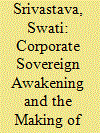

|
|
|
|
|
| Summary/Abstract |
The English East India Company's “company-state” lasted 274 years—longer than most states. This research note uses new archival evidence to study the Company as a catalyst in the development of modern state sovereignty. Drawing on the records of 16,740 managerial and shareholder meetings between 1678 and 1795, I find that as the Company grew through wars, its claim to sovereign authority shifted from a privilege delegated by Crown and Parliament to a self-possessed right. This “sovereign awakening” sparked a reckoning within the English state, which had thus far tolerated ambiguity in Company sovereignty based on the early modern shared international understanding of divisible, nonhierarchical layered sovereignty. But self-possessed nonstate sovereignty claimed from the core of the state became too much. State actors responded by anchoring sovereign authority along more hierarchical, indivisible foundations espoused by theorists centuries earlier. The new research makes two contributions. First, it introduces the conceptual dynamic of “war awakens sovereigns” (beyond making states) by entangling entities in peacemaking to defend sovereign claims. Second, it extends arguments about the European switch from layered sovereignty to hierarchical statist forms by situating the Company's sovereign evolution in this transformation. Ultimately, this study enables fuller historicization of both nonstate authority and the social construction of sovereignty in international politics.
|
|
|
|
|
|
|
|
|
|
|
|
|
|
|
|
| 18 |
ID:
145673
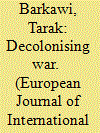

|
|
|
|
|
| Summary/Abstract |
What would it mean to decolonise the concept of war? ‘Decolonising’ means critiquing the ways in which Eurocentric ideas and historiographies have informed the basic categories of social and political thought. Dominant understandings of the concept of war derive from histories and sociologies of nation-state formation in the West. Accordingly, I critique this Eurocentric concept of war from the perspective of Small War in the colonies, that is, from the perspective of different histories and geographies of war and society than were assumed to exist in the West. I do so in order to outline a postcolonial concept of war and to identify some of the principles of inquiry that would inform a postcolonial war studies. These include conceiving force as an ordinary dimension of politics; situating force and war in transnational context, amid international hierarchies; and attending to the co-constitutive character of war and society relations in world politics.
|
|
|
|
|
|
|
|
|
|
|
|
|
|
|
|
| 19 |
ID:
087476


|
|
|
|
|
| Publication |
2009.
|
| Summary/Abstract |
This article examines various implications of democratic peace theory in both the contemporary era and in Greece during the Peloponnesian War era. It considers the evidence for various hypotheses in both contexts, to understand why those hypotheses - especially those concerning institutions - find much better support in the contemporary era. It also addresses the causes and possible consequences of expansionist policies, including hypotheses that democracies are more effective war-fighters and thus better able to pursue successful expansion by military means.
|
|
|
|
|
|
|
|
|
|
|
|
|
|
|
|
| 20 |
ID:
084675
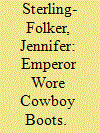

|
|
|
|
|
| Publication |
2008.
|
| Summary/Abstract |
Why does it matter if the United States is an empire in any objectively definable sense? All this academic and political pundit hand-wringing, over whether the United States should technically be labeled an empire or not, seems oddly out of step with the sorts of egregious foreign policy behaviors the United States engages in on a daily basis. Yet the words we use to describe something do matter a great deal to what we see and how we act in the world. In this paper, I argue that the closer one looks at the debate over the empire designation, the more one begins to see an underlying dynamic of political self-delusion that is endemic to the American power project. America wields enormous power that affects the daily lives of people around the globe, but like a schoolchild on the playground it does not like to be called names. The extent to which political observers participate in this obfuscation is an interesting topic in its own right, as it underscores how name-calling is a political act in itself.
|
|
|
|
|
|
|
|
|
|
|
|
|
|
|
|
|
|
|
|
|